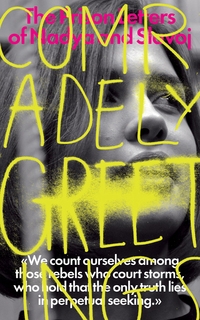Comradely Greetings is the product of an almost-two-year-long correspondence between Slovenian Marxist philosopher Slavoj Žižek and Pussy Riot member Nadya Tolokonnikova, dating from the latter’s imprisonment in August 2012 for performing a ‘punk prayer’ against Vladimir Putin in Moscow’s largest Orthodox church, to a few months after her release, in March 2014.
Contrary to expectations, however, these prison letters barely make reference to the Gulag-like conditions in which Tolokonnikova was held. Rather, the exchange features political debates on issues such as the limits and dangers of global capitalism and the future of liberal democracy, the value of protest and the power of artistic subversion.
Referencing everything from Nietzsche and Hegel to Alain Badiou and Russian folkloric songs, this short compilation sheds light on the sharp philosophical reflections behind Pussy Riot’s activism, and Tolokonnikova proves capable of challenging the discourse of the sexagenarian philosopher. But despite her passion and undeniable erudition, it is Žižek’s more nuanced and pragmatic discourse, which emerges from an in-depth analysis of contemporary politics and events, that most often appears to set the tone of the discussion. Particularly impressive is his worldview of protest phenomena and their aftermaths: from the Arab Spring and the Gezi Park protests, to the Ukranian uprisings and diverse forms of the Occupy movement.
The dynamic of the epistolary format allows the writers to analyse their arguments in a structured way while nevertheless maintaining a personal and lively tone. Thought-provoking and exhilaratingly radical in discourse, Comradely Greetings communicates a stimulating sense of urgency, calling for the reader to, as Žižek puts it, ‘think beyond capitalism and liberal democracy as the ultimate framework of our lives’.
This article was first published in the Autumn & Winter 2014 issue of ArtReview Asia.
